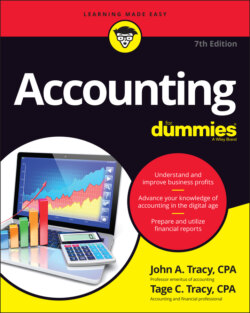Читать книгу Accounting For Dummies - John A. Tracy - Страница 68
Get involved in end-of-period procedures
ОглавлениеSuppose that all transactions during the year have been recorded correctly. Therefore, the business is ready to prepare its financial statements from those accounts, isn’t it? Not so fast! As we explain earlier in “Finishing up for the period” (see Step 5), certain additional procedures are necessary at the end of the period to make sure that the accounts are correct and complete for preparing financial statements and income tax returns for the year. Two main things must be done at the end of the period:
Record normal, routine adjusting entries. For example, depreciation expense isn’t a transaction as such and therefore isn’t included in the flow of transactions recorded in the day-to-day bookkeeping process. (Chapter 6 explains depreciation expense.) Similarly, certain other expenses and income may not have been associated with a specific transaction and therefore haven’t been recorded. In many businesses, there’s a normal lag in recording certain transactions, such as billing customers for services already provided. These “catch up” entries should be recorded. Year-end adjusting entries are necessary to have correct balances for determining profit for the period. The purpose is to make the revenue, income, expense, and loss accounts up to date and correct for the year.
Make a careful sweep of all matters to check for other developments that may affect the accuracy of the accounts. For example, the company may have discontinued a product line. The remaining inventory of these products may need to be removed from the inventory asset account, with a corresponding loss recorded in the period. Or the company may have settled a long-standing lawsuit, and the amount of damages needs to be recorded. Layoffs and severance packages are another example of what the chief accountant needs to look for before preparing reports.
Lest you think of accounting as dry and dull, let us tell you that end-of-period accounting procedures can stir up controversy of the heated-debate variety. These procedures require that the accountant make decisions and judgment calls that upper management may not agree with. For example, the accountant may suggest recording major losses that would put a big dent in profit for the year and cause the business to report a loss. The outside CPA auditor (assuming that the business has an independent audit of its financial statements) often gets in the middle of the argument. These kinds of debates are precisely why business managers need to know some accounting: to hold up their end of the argument and participate in the great sport of yelling and name-calling — strictly on a professional basis, of course.
This also touches on a concept that you may hear from time to time — that accounting is just as much of an art form as a science. What we mean by this is that while accounting is a technical profession that has a large amount of authoritative content to work with and provides guidance, the actual application of accounting concepts, rules, and regulations (in the real world where internal management pressures can be significant) is often fairly subjective.
